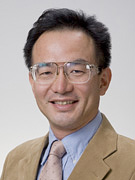Course of
Field Study of Cultures
Professor NISHIMOTO Yoichi (Field Study of Cultures)
| [Theme] | Study of Cultures |
|---|

My specialty is cultural anthropology. Cultural anthropology is the study of one's own cultures through understanding other cultures, as well as considering things that we take for granted from new perspectives for the betterment of society. What I specifically study includes the Lahu highlanders of northern Thailand, Theravada Buddhism of Thailand, and Buddhism in Japan.
I have studied the society and culture of the Lahu minority living in the hills of northern Thailand for over ten years through long-term fieldwork. More than a few members of the Lahu tribe are Christians. Meanwhile, there is also a traditionalist faction that attempts to protect "the true Lahu ways of living of the ancestors' era" against modernization. I investigate and conduct comparative studies on both Christians and traditionalists in the Lahu society and culture, especially in terms of religion. This religious research focuses on resolving questions related to the differences and similarities between Christians and traditionalists, as well as what significance religion has for a minority people in order to enhance their position. In other words, I believe that we can perceive the conversion to Christianity and religious revival movements as a response from those in a weakened position to the great trends of our time such as modernization and globalization.
Of late, I have also been using my research experience among the Lahu in Thailand as a foothold to begin studying the Lahu living in China's Yunnan Province (as one Lahu man puts it, "people with no country can live anywhere," members of Lahu can be found living in Thailand, Burma (Myanmar), China, Laos, and Vietnam). Although they are members of the same ethnic group, various disparities in their society and culture have arisen due to living in different national contexts. Ever since its renewed establishment in 1949, China has gone through massive social upheavals such as collectivization, the Cultural Revolution, and reform policies opening up to the outside world. I consider the question of what sort of experiences the ethnic minorities including the Lahu underwent at the daily level amidst all of this political turmoil.
My studies of Theravada Buddhism of Thailand focuses on the issue of where the Thai people find happiness. In Thai Buddhism, monks prepare for salvation while the lay masses endeavor to make merits, such as donating to the monks and temples, in order to receive happiness in this life as well as the next. People do not simply sit back and wait for fate to come upon them, instead they work everyday to accumulate merit in order to gain new happiness.
It was while studying foreign religions that I became intrigued by the idea of taking a look back at the religions of Japan. Often called "funeral Buddhism," the Buddhism of Japan is strongly tied to death and ancestors. However, I would also like to explore how it is connected to the happiness of those living today.

